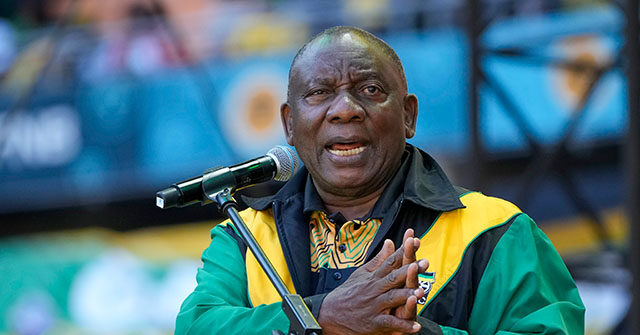The trip should be an opportunity for South Africa and the U.S. to discuss differences and work toward far-reaching compromises. Instead, South Africa is bringing the wrong attitude: that the differences between the two sides are due to “misinformation.”
That has been President Ramaphosa’s line since the diplomatic confrontation began earlier this year, when President Trump suspended aid to South Africa and offered asylum to Afrikaner refugees.
Instead of offering to change the policies, both domestic and foreign, that Trump specifically criticized, Ramaphosa and the ruling African National Congress have blamed their critics for feeding “misinformation” to the White House.
That claim was echoed by Minister of Agriculture John Steenhuisen, who is set to be the sole opposition member — and the only white member — of Ramaphosa’s five-member delegation to the U.S. this week. In remarks last week, he slammed the first wave of Afrikaner refugees, and described the visit to Washington as a chance “to dispel some of the myths and disinformation that have been whispered in [Trump’s] ear.”
That simply repeated the conspiracy theories circulating in South Africa that Trump’s policies are due to the manipulations of Elon Musk and other former South Africans, perhaps communicated by Afrikaner groups such as Afriforum, whose leaders are currently under investigation for treason. The South African media have often followed suit, with News24 recently exposing a random X user it said was informing the U.S. president.
Trump was, in fact, very specific about his differences with South Africa. His February executive order read:
In shocking disregard of its citizens’ rights, the Republic of South Africa (South Africa) recently enacted Expropriation Act 13 of 2024 (Act), to enable the government of South Africa to seize ethnic minority Afrikaners’ agricultural property without compensation. This Act follows countless government policies designed to dismantle equal opportunity in employment, education, and business, and hateful rhetoric and government actions fueling disproportionate violence against racially disfavored landowners.
In addition, South Africa has taken aggressive positions towards the United States and its allies, including accusing Israel, not Hamas, of genocide in the International Court of Justice, and reinvigorating its relations with Iran to develop commercial, military, and nuclear arrangements.
Trump focused on: the recently-signed Expropriation Act, which allows the government to take land without compensation, and was accompanied by plans to redistribute land along racial lines; racial discrimination in employment, recently reinforced by proposed government quotas on the percentage of white employees by industry; the incendiary rhetoric of anti-white politicians like opposition figure Julius Malema, whom South Africa’s courts have declined to rein in; South Africa’s morally twisted case against Israel, which argues that the Jewish state has no right to defend itself against terror; and South Africa’s support for Iran, even as the Iranian regime has used its terrorist proxies to attack Israel, the U.S., and international shipping near Africa.
Steenhuisen focused on disputing Trump’s claim, made elsewhere, that there is a “genocide” of white South Africans. His role in the delegation may be to represent a living refutation of that claim; after all, if genocide were taking place, why would he be in the government? (Notably, South Africa rejects such arguments when Israel notes that Arabs serve in its government.) Regardless, that does not address the issues Trump raised.
Trump is only asking for compromises that will help South Africa. But Ramaphosa set the tone last week by calling Afrikaner refugees in the U.S. “cowardly,” and Steeinhuisen has followed in a similar vein.
Thus the attitude of the South African delegation seems to be that they are going to Washington to argue with Trump. If so, they may be in for a comeuppance — and will miss a crucial opportunity to turn their country around.
Instead of preparing to lecture Trump on why he is “misinformed,” South Africa should come prepared with compromises on all of the issues listed above, such as the following:
- Amend the Expropriation Act to protect private property and eliminate the possibility of “nil compensation”;
- Drop the use of racial quotas or targets in employment, and exempt foreign companies from burdensome racial regulations, such as Black Economic Empowerment;
- Enforce South Africa’s existing laws on hate speech against Julius Malema, and speak out more forcefully against him;
- Withdraw from the failing and immoral ICJ case against Israel;
- Stop supporting Iran, and come clean about cooperation with the regime, including commercial ties and nuclear technology.
If the South African delegation is not prepared to discuss any of the above, it may as well have stayed home.
Joel B. Pollak is Senior Editor-at-Large at Breitbart News and the host of Breitbart News Sunday on Sirius XM Patriot on Sunday evenings from 7 p.m. to 10 p.m. ET (4 p.m. to 7 p.m. PT). He is the author of Trump 2.0: The Most Dramatic ‘First 100 Days’ in Presidential History, available for Amazon Kindle. He is also the author of The Trumpian Virtues: The Lessons and Legacy of Donald Trump’s Presidency, now available on Audible. He is a winner of the 2018 Robert Novak Journalism Alumni Fellowship. Follow him on Twitter at @joelpollak.
Breitbart News
Read the full article .


